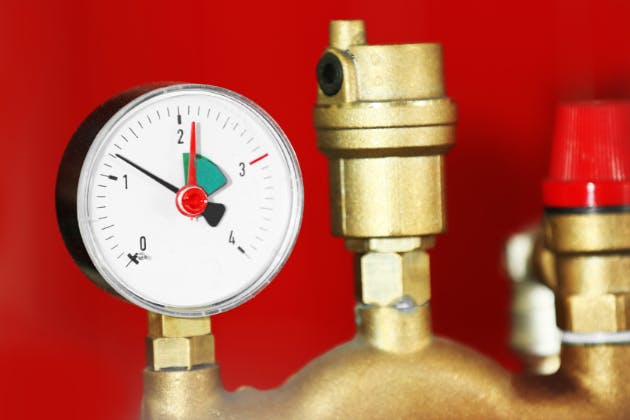Your boiler may occasionally start to lose pressure, which can cause a number of issues. Our heating engineers across Brackley, Milton Keynes, Northampton and the surrounding areas have listed many causes of boiler pressure loss as well as possible solutions in this blog.
What is the ideal boiler pressure?
Depending on the type of boiler you have, there are different ideal boiler pressures. The majority of boilers typically run between 1 and 2 bars of pressure. To find the correct pressure for your particular model, it is important to consult your boiler's manual.
Why boilers lose pressure

Faulty pressure relief valve
When the system's pressure rises too much, the pressure relief valve is in charge of releasing water. A broken pressure relief valve might result in a constant water leak, which lowers boiler pressure.
You might need to replace the pressure relief valve if it is malfunctioning. You can buy a replacement valve from a reputable seller and install it according to the directions provided by the manufacturer.
Identifying leaks requires careful inspection, so watch for water stains around connections, damp patches on walls or floors, visible water droplets, and any signs of corrosion around pipe joints.
If you suspect your pressure relief valve is leaking:
- Check the overflow pipe outside for constant dripping
- If leaking, you'll need a professional to replace the valve
- Don't attempt to adjust or repair the valve yourself, as this is a safety component
Faulty gauge
The pressure can also fall due to a broken pressure gauge; we highly recommend getting the component repaired or replaced so your boiler pressure can get to its normal level.
It is best to consult with a qualified heating engineer to diagnose the problem and replace the component if necessary.
Blockage
Debris or sludge buildup in the system can obstruct the flow of water and lower pressure. The radiators, pipes, and other components of the system might all become blocked.
By flushing the system with a proper chemical cleaner, you can unblock the system if there is a clog. You can get a chemical cleaner from a reliable vendor and use it according to the directions on the label.
Corroded pipes
Leaks and a decrease in pressure can occur as a result of corroded pipes. The pipes may become more vulnerable to corrosion, and eventually, they may grow holes or breaks that permit water to leak out.
You must replace the corroded pipes if you've determined that they're to blame for your boiler's pressure loss. To replace the corroded pipes and guarantee that the system is correctly sealed, make sure to hire a qualified plumber.
How to Fix Low Boiler Pressure
Repressurise Your Boiler
To fix low boiler pressure, start by locating the filling loop beneath your boiler and ensure the system is completely cold before proceeding. Once ready, slowly open both valves whilst keeping an eye on the pressure gauge, then close them firmly when it reaches 1.5 bars, making sure to check that the pressure remains stable.
Bleeding Your Radiators
If you need to bleed your radiators, use a radiator key to slowly open the valves, releasing any trapped air until water begins to flow, then close them securely and remember to repressurise your system afterwards to maintain optimal performance.
When to Seek Help
If you've tried these steps and are still experiencing issues, it's best to contact a qualified heating engineer who can properly diagnose and fix any underlying problems affecting your boiler's pressure.
At Elements Heating Installations, our heating engineers are here to help with any questions you have. Please get in touch by calling us on 07875 344794.



